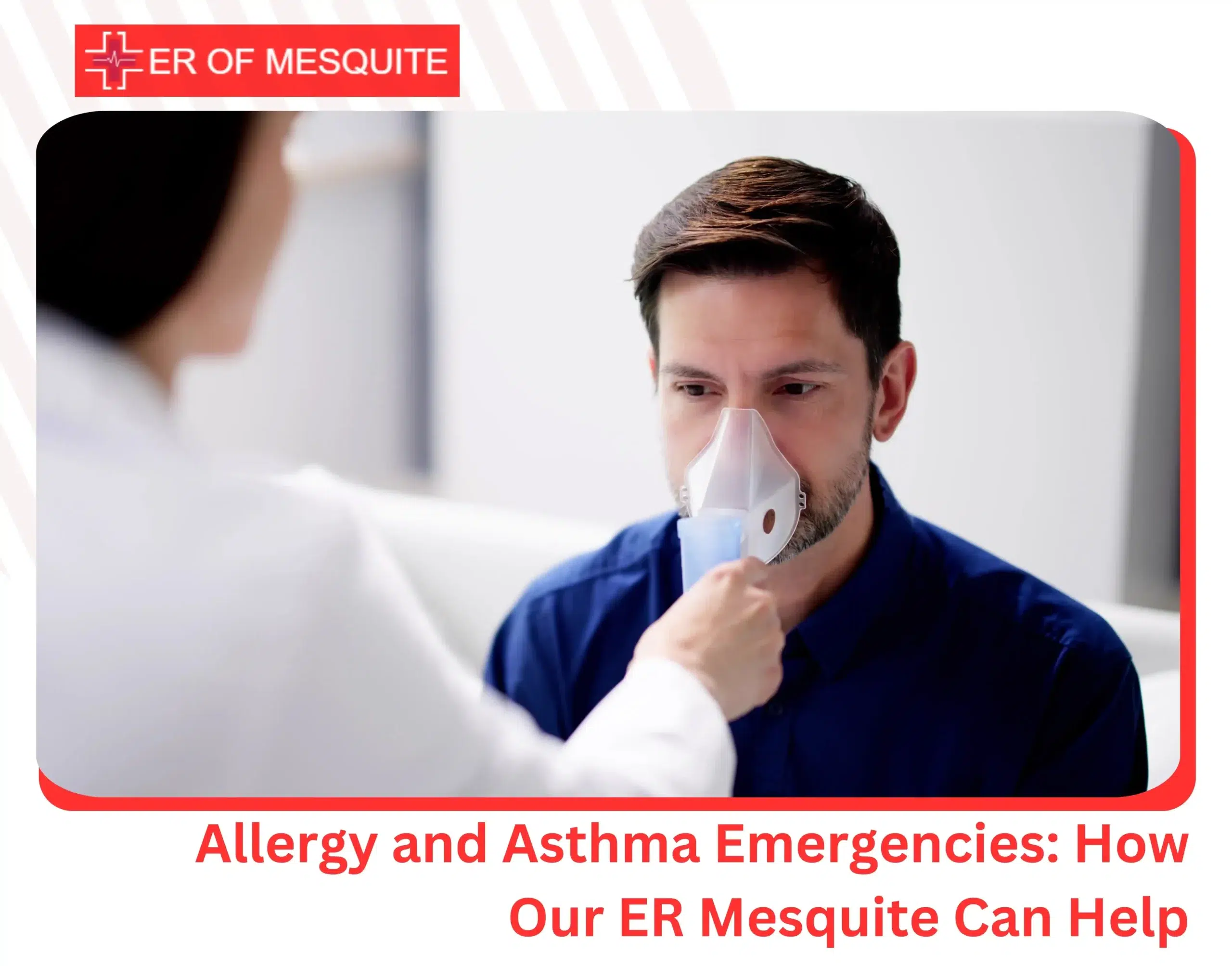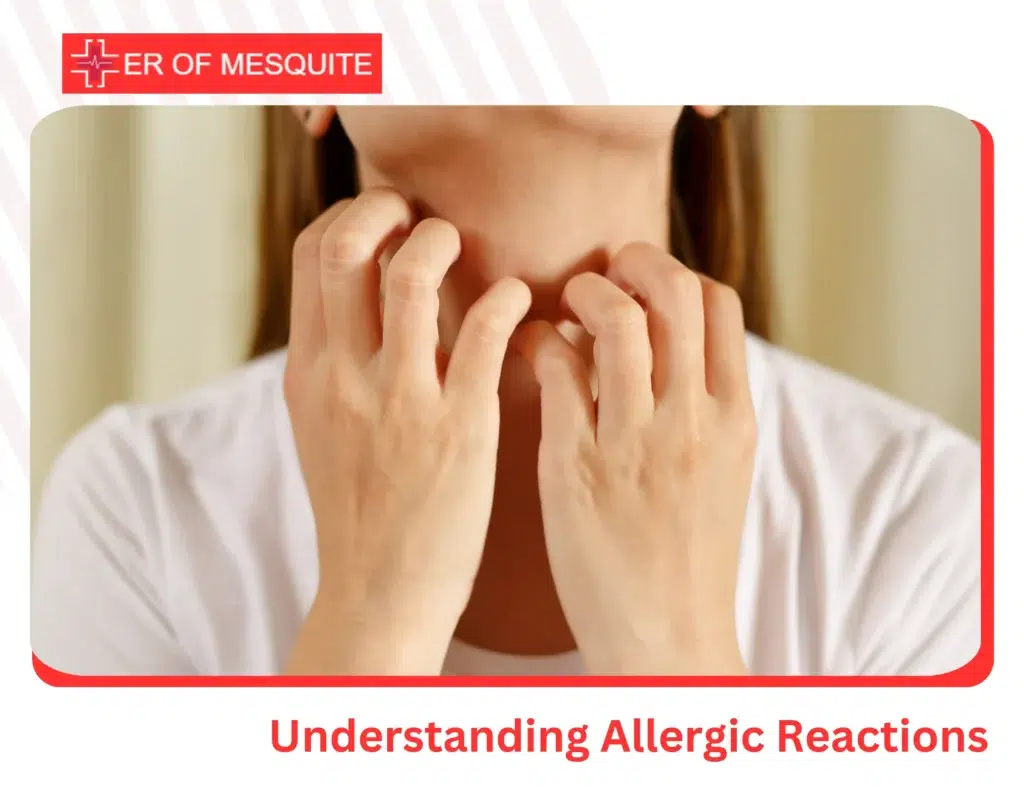In Mesquite, where seasonal allergens and changing weather can trigger severe reactions, living with allergies or asthma means staying alert. What begins as a mild itch or slight wheezing can quickly spiral into something far more dangerous, like sudden swelling, trouble breathing, or a racing heartbeat.
At ER of Mesquite, we see these rapid transitions daily, where quick access to emergency care makes all the difference. Let’s help you understand when a reaction crosses into emergency territory and how our ER is your trusted partner for allergy and asthma emergencies in Mesquite.
Understanding Allergic Reactions
Allergic reactions happen when the immune system reacts excessively to a harmless substance, such as pollen or certain foods. Mild symptoms can include sneezing, itchy eyes, or rashes.
On the other hand, serious allergic reactions, known as anaphylaxis, can develop rapidly and necessitate immediate medical attention.
Symptoms of Anaphylaxis:
- Difficulty breathing or swallowing
- Swelling of the lips, tongue, or throat
- Dizziness, fainting, or a sudden drop in blood pressure
- Severe hives or skin reactions
- Fast or irregular heartbeat
Without immediate treatment, severe reactions can lead to shock or cardiac arrest. Quick intervention can stop these dangerous symptoms in their tracks.
Recognizing Asthma Emergencies
Asthma episodes stem from inflammation and constriction of the airways, hindering the ability to breathe. While mild to moderate symptoms can usually be controlled with a rescue inhaler, severe episodes can pose significant risks to life.
Symptoms of an Asthma Emergency:
- Intense shortness of breath that worsens quickly
- Wheezing or coughing that fails to improve
- Inability to articulate more than a few words at a time
- Blue or gray tinges of the lips or nails (cyanosis)
- Fast breathing or persistent chest tightness
Delaying care during these emergencies can lead to dangerous oxygen deprivation. At the ER of Mesquite, we provide fast asthma attack treatment and management to open airways and restore normal breathing..
Common Causes of Allergies and Asthma
Allergies can be caused by various substances in the environment or through direct contact.
Common Allergens
- Food Allergens: Peanuts, tree nuts, shellfish, dairy products, and eggs are often the culprits.
- Insect Stings: Stings from bees or wasps can lead to severe reactions in those who are sensitive.
- Environmental Factors: Pollen, mold, dust mites, and pet dander are typical irritants.
- Medications: Certain antibiotics, pain relievers, or vaccines can trigger an allergic reaction.
Asthma Triggers
Asthma attacks are frequently provoked by irritants or allergens, including:
- Airborne allergens, such as pollen or mold
- Cold air or abrupt weather changes
- Respiratory illnesses, like colds or flu
- Smoke, chemical vapors, or strong scents
- Triggers related to physical activity
Recognizing personal triggers aids in avoiding emergencies, but accidental exposure remains a possibility.
When to Seek Emergency Care For Allergy and Asthma
It’s essential to know when to go to the ER versus treating symptoms at home. Seek emergency assistance if:
- Breathing issues escalate, even after using a rescue inhaler
- Signs of anaphylaxis, such as swelling in the throat or fainting
- There’s disorientation, chest discomfort, or bluish skin
- A severe asthma attack continues longer than expected
- A new trigger leads to an unexpected, serious reaction
Do not hesitate to seek help for life-threatening symptoms, swift action can avert further complications.
Preventing Allergy and Asthma Emergencies
Proactive Measures for Allergy Management
- Avoid Known Triggers: Stay alert about food labels, avoid areas with high pollen, and minimize dust or mold in your living space.
- Keep an Epinephrine Auto-Injector Handy: Tools like EpiPens can counteract anaphylactic reactions, giving you time to seek emergency help.
- Inform Family and Friends: Make sure those around you can identify symptoms and know how to provide emergency care.
- Utilize Preventative Medications: Taking daily antihistamines or prescribed drugs can help lessen sensitivity to allergens.
Strategies for Asthma Management
- Adhere to an Action Plan: Collaborate with a healthcare professional to devise a detailed plan for managing asthma attacks.
- Incorporate Maintenance Medications: Daily controllers are crucial for preventing inflammation and decreasing the likelihood of severe attacks.
- Keep Track of Air Quality: Monitor pollution and pollen counts before engaging in outdoor activities.
- Avoid Respiratory Irritants: Shield yourself from cold air, smoke, or viral illnesses during vulnerable seasons.
Supporting Families and Children
Allergy and asthma emergencies can be particularly alarming for children. As a parent or guardian, it is vital to:
- Identify early signs of trouble, such as coughing, wheezing, or behavior changes.
- Ensure that medications, like rescue inhalers or auto-injectors, are easily accessible.
- Discuss your child’s condition with schools or caregivers and provide explicit instructions for emergency handling.
Our ER team is skilled in treating young patients, providing a calm and supportive atmosphere for families during challenging times.
Why Choose Mesquite ER for Allergy and Asthma Emergencies
In a city like Mesquite, where allergens and environmental triggers are prevalent, having access to a reliable emergency care facility is essential.
Here’s how our ER is equipped to handle allergy and asthma emergencies:
Quick Response and Evaluation
Our staff recognizes the necessity of swift action. From the moment you come in, we evaluate your symptoms to gauge the seriousness of the scenario. For asthma episodes, we monitor oxygen levels and lung performance, while for allergic reactions, we look for indications of anaphylaxis or shock.
Advanced Treatment Options
We employ effective treatments to stabilize patients:
- Epinephrine Injection: This life saving shot stops severe allergic reactions
- Nebulizer Treatments: Asthma episodes are managed with bronchodilators administered through nebulizers to relax airways and enhance breathing.
- Oxygen Therapy: For patients facing respiratory distress, oxygen supply guarantees sufficient levels in the bloodstream.
- IV Medications: Antihistamines, corticosteroids, and fluids are utilized to alleviate inflammation and effectively control symptoms.
Note: Never attempt to self-administer medications without proper medical guidance.
Continuous Monitoring and Support
Our emergency room offers continuous observation for critical cases, making sure that complications such as airway swelling or oxygen deprivation are tackled immediately. Patients are released only when stable, or directed for further treatment if required.
24/7 Availability
Emergencies don’t wait for suitable times. Our emergency room is available 24/7 to ensure you get prompt care whenever an allergy or asthma crisis occurs.
Key Takeaway
Severe allergic reactions and asthma attacks can quickly spiral into emergency territory. Don’t second-guess symptoms like difficulty breathing, throat swelling, persistent wheezing, or intense coughing that doesn’t respond to normal treatments.
At the ER of Mesquite, our emergency team provides immediate care for allergy and asthma emergencies 24/7. We combine swift intervention with experienced judgment to stop these reactions in their tracks.
FAQs
How can I reduce asthma at home?
To reduce asthma at home, avoid triggers like dust, pet dander, and pollen. Use air purifiers and clean regularly. Follow prescribed medication routines.
Is steam good for asthma?
Yes, steam can help ease breathing by loosening mucus. However, be cautious as it may trigger symptoms in some individuals.
What is the 4x4x4 rule for asthma?
Give 4 puffs of a reliever inhaler. Take 4 breaths after each puff and wait 4 minutes before repeating if necessary



